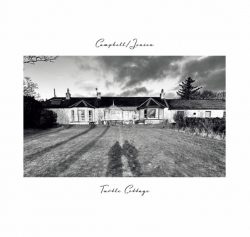Top-notch musicianship, vast landscapes and intimate domestic scenes on commendable debut.
 ‘Turtle Cottage’ is the debut album from duo Ashley Campbell and Thor Jensen, both seasoned musicians in their own right, who met in Nashville in autumn 2021 when Jensen gave Campbell some lessons in gypsy jazz guitar. The album is a mix of heartfelt ballads, lightly humorous, bluesy ditties and technically stunning, evocative instrumentals; across its forty-seven minutes, the duo split the balance of styles pretty well, creating a well-structured and engaging listen. The album feels more like a collection of individual tracks, rather than a conceptual piece bound by one idea or theme, though it is worth noting the recurrence of several themes: weathering emotional storms and challenges, the therapeutic effect of relationships and reciprocity, calmness and domesticity, and also the urge for adventure.
‘Turtle Cottage’ is the debut album from duo Ashley Campbell and Thor Jensen, both seasoned musicians in their own right, who met in Nashville in autumn 2021 when Jensen gave Campbell some lessons in gypsy jazz guitar. The album is a mix of heartfelt ballads, lightly humorous, bluesy ditties and technically stunning, evocative instrumentals; across its forty-seven minutes, the duo split the balance of styles pretty well, creating a well-structured and engaging listen. The album feels more like a collection of individual tracks, rather than a conceptual piece bound by one idea or theme, though it is worth noting the recurrence of several themes: weathering emotional storms and challenges, the therapeutic effect of relationships and reciprocity, calmness and domesticity, and also the urge for adventure.
The album opens with ‘P&P‘; a relatively sparse tune on fingerpicked guitar, it switches between melancholy folk and descending Latin, bluesy passages. Campbell’s vocal is clear and direct, bolstered by Jensen’s subtle but essential backing vocals. This is followed by ‘At Long Last’, with its open-tuned acoustic guitar lifting a curtain to reveal a vast vista, the gently trotting rhythm guitar setting the pace, and Campbell’s vocal crisp like a clear morning. A love song at heart, it explores the idea of fate, and trusting one’s own gut: “I could easily have missed out on this, had I taken the train instead of walking home”.
‘A Song By Vampires, For Vampires’ is a standout. It is a chirpy banjo and guitar folk tune about vampires in love, playing on love song tropes with a knowing nod: “I catch a chill when my lover bites”, “We’re gonna live ‘til the end of time/ Honey, I’m so glad you’re mine”. There is something highly reminiscent of an Anais Mitchell-led Bonny Light Horseman tune here – something that may encourage a number of Americana UK readers to take a listen.
‘Run With You’ and ‘Perfectly Alright’ are gentler tracks with general rather than specific lyrics, the first track about wishing to escape with someone important and get away from the daily grind, the second about domesticity and relaxation. Campbell leads on ‘Run With You’, which is a pleasant enough tune with a very relatable sentiment, albeit perhaps a little too long. Jensen and Campbell trade verses and duet on ‘Perfectly Alright’; the steady strum, clockwork banjo and tranquil lyrics fashion an atmosphere where time passes slowly and softly, where there is no rush whatsoever; the track could be seen as a companion piece to, or the balm for, the emotional drama of ‘P&P’.
The album hinges on two instrumentals, splitting it into thirds and allowing Campbell and Jensen to display their considerable technical talent. ‘Edge of the World’ conjures a frontier atmosphere, with its bluegrass-inflected interplay of metronomic, pulsing guitar and intricate banjo, marked with synchronised harmonic breaks. The track is an upbeat trot, segueing from section to section and almost mirroring changes in terrain and mood over a long journey into unknown lands; the slower interludes, interspersed with minor passages, are particularly affecting.
‘Exit Zero’ is a show of virtuosity, veering between frantically accelerating passages of fingerpicked banjo and winding guitar melodies, gently bucolic, front-porch style duets, and halting, slapstick-leaning breaks. Toward the tail-end of the track there is a transient but hypnotic contemplative section marked by thoughtfully placed guitar harmonics, like sparsely spaced streetlights on an empty highway. Despite the folk instrumentation, the melodies, time signatures, syncopation and eclectic structure give the track a slightly prog-rock feel.
Following ‘Exit Zero’, the last third of the album comprises a run of four tracks that tread closer to blues, country and gypsy jazz than the folkier sound of the earlier part of the album. Here, the album loses some of its momentum and intrigue, but maintains a steady output of quality songs. ‘Goodbye Cowboy’ has a Spanish-style guitar part and finds more typical lyrical ground, bidding goodbye to an “old flame” who is no longer needed, as the song’s narrator is ready to move on “searching for the better days”. ‘It’s Hard Not To Smile’ is an understated, jazzy number featuring the album’s sole electric guitar – it sounds a bit like diegetic music from a café scene of a Woody Allen film.
‘Tank and Babe’ is an eight-bar blues which humorously recounts a doomed relationship’s arc, featuring a nifty acoustic guitar solo two-thirds of the way through. The quickly-sung verses display a vocal dexterity and natural wit. Lastly, ‘Waiting on the Summertime’ faithfully recreates the gypsy jazz sound that Campbell grew up listening to with her father, and the love of which fatefully spawned the fruitful musical relationship which led to this commendable debut album.


